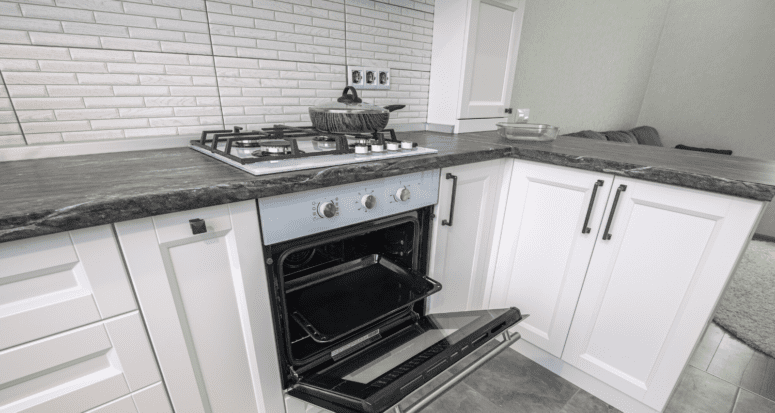Does Converting to Natural Gas Add Value to Your Home?
- Published on
- 5 min read
-
 Valerie Kalfrin Contributing AuthorClose
Valerie Kalfrin Contributing AuthorClose Valerie Kalfrin Contributing Author
Valerie Kalfrin Contributing AuthorValerie Kalfrin is a multiple award-winning journalist, film and fiction fan, and creative storyteller with a knack for detailed, engaging stories.
With roughly 47% of homes nationwide using natural gas as their main heating fuel, you might wonder if it’s time to retire that oil furnace or electric heat pump and tap into this pipeline for all of your energy needs. But does natural gas add value to a home?
Natural gas is a relatively clean-burning fossil fuel, boosting its popularity as the source for generating electricity, according to the U.S. Energy Administration (EIA). It also can save consumers money, costing the average New England house with around 1,860 heated square feet about four times as less as electric resistance heat in 2019-2020.
But switching to natural gas isn’t as simple as, well, flipping a switch. The cost to convert your home to natural gas doesn’t necessarily equal a bump in asking price when it’s time to sell, either, according to our experts and research.
“It adds a little bit of value, but I think it’s less dollars and [more of] making it an easier sell,” says Robert McGarty, a top-selling agent in the Seattle, Washington, area with more than two decades of experience.
Because of fluctuations in energy consumption, among other issues, answering “Does natural gas add value to a home?” unfortunately isn’t as straightforward as yes or no — but hang in there. We’ll help clear the air so you can decide what works best for you.

What are the benefits of natural gas?
Natural gas is a fossil fuel that formed deep beneath the earth’s surface, according to the EIA. While geologists can find places to drill for this gas, companies also can obtain it through a process called hydraulic fracking, which pumps water and chemicals at high pressure underground to fracture shale and other rock, allowing natural gas to escape.
It offers several benefits:
Affordability
Natural gas appliances reduce utility costs. The American Gas Association (AGA) founded in 1918, represents more than 200 local energy companies serving more than 71 million natural gas customers nationwide. It estimates that consumers using natural gas save an average of $1,132 on energy bills each year compared to those who use electricity.
Washington Gas, which serves parts of Virginia, Maryland, and Washington, DC, compared the average estimated annual operating costs of a standard-efficiency furnace as follows:
- Natural gas (80% AFUE rating): $574
- Electric heat pump (8.7 HSPF rating): $838
- Residential heating oil (#2; 80% AFUE rating): $1,238
- Propane (80% AFUE rating): $1,912
- All-electric furnace/resistance heat: $1,965
The Energy Solutions Center, a nonprofit organization of energy utilities and equipment manufacturers that promote natural gas solutions, provides an online calculator for homeowners to estimate their individual cost savings.
For instance, a household that used 100 gallons of heating oil per year at $3 per gallon would save $175 with natural gas; one that used the same amount of propane at the same price would save $218 with natural gas.
Utility companies also offer rebates that can be combined with those of equipment manufacturers as incentives to replace old appliances with those that use natural gas.
Andrew Monaghan, a longtime agent in the Phoenix, Arizona, area who is a single-family homes expert, says natural gas powers his furnace and water heater at home. “Natural gas allows you to have a much more predictable bill because it is much, much cheaper than utilizing electricity here in Arizona,” he says.
Better baking
Natural gas can fuel a barbecue grill, fire pit, or fireplace, as well as a gas range or other cooktop. Consumer Reports rates electric ranges higher in general for broiling, boiling water faster, and providing steadier low heat for simmering, but the magazine gives gas ranges the edge for baking.
That said, buyers who know their way around a kitchen tend to ask about natural gas. “I’ve had buyers that only want gas because they do a lot of cooking, and they want to be able to get restaurant-level food, and all restaurants utilize gas,” Monaghan says.
Dependability
Aside from being able to run a variety of appliances, natural gas is more efficient than other energy sources, cuts carbon emissions in half, and is abundant, with 2.5 million miles of pipeline throughout all 50 states, the AGA says.
Also, power outages and severe weather don’t affect natural gas, making it a good fuel source for a standby generator, the association says.

Any drawbacks to natural gas?
For all of its perks, natural gas does create some concerns.
Perception of safety
From 2000 to 2019, there were 1,436 incidents involving gas distribution pipelines, which distribute gas to homes and businesses, according to the US Pipeline and Hazardous Materials Safety Administration (PHMSA). These incidents caused 203 deaths, 918 injuries, and cost about $2.9 billion, PHMSA statistics show.
Natural gas is odorless, so one such safety measure is for companies to add a substance called mercaptan, which smells like rotten eggs, to natural gas so that people can detect leaks.
Nevertheless, some consumers are still wary. “The biggest fear a lot of people have is, is it going to blow up?” Monaghan says. “Realistically, that’s a nonstarter because it’s very, very safe, and there’s a certain level of maintenance — same as with anything else — to do to protect yourself and your family.”
Climate concerns
Natural gas contains methane, a greenhouse gas that significantly warms the Earth’s atmosphere — as much as 80 times more than carbon dioxide, according to Popular Mechanics.
Fracking also has potential environmental risks including the possible contamination of groundwater, according to Greenpeace, citing studies from the US Environmental Protection Agency, Duke University, and the journalism site ProPublica.
Local availability
For these environmental reasons, some municipalities are reconsidering whether to allow natural gas lines in new homes. Berkeley, California, in 2019 became the first city in the country to ban natural gas lines from new homes. The Seattle City Council considered enacting such a ban on newly constructed homes as well.
Although that legislation did not pass, the Seattle area favors green and renewable energy, such as induction cooktops that use electromagnetic fields, McGarty says. These cooktops have high safety ratings because the surface doesn’t get hot without a pan on it, even if you turn on the wrong burner by mistake.
How much does it cost to convert to natural gas?
The costs of converting to natural gas vary depending on your home’s size, age, location, insulation level, number of occupants, and typical temperature setting, according to Energyshop.com, a website of commodity consultants and analysts that since 1998 has compared the costs of converting to natural gas.
In general, converting a house of 1,600 to 2,000 square feet that uses about 100,000 BTUs per hour would cost about $2,800 just for a mid-efficiency furnace. Converting to a mid-efficiency boiler for that size would cost about $2,500.
However, these estimates assume that there is a natural gas main on the street that is 90 feet or less from your house, and that the installation requires less than 30 feet of gas pipe inside the house. Installing a new gas line alone costs an average of $522, according to HomeAdvisor.com, but this can vary by location and complexity.
“Here, the gas utility has lines running down most streets,” McGarty says “If you’re on one of those streets and you don’t currently have gas, it’s pretty easy to hook up, and it’s not very expensive. If you’re a block away from one of those lines, then it starts to get really expensive, and it’s just not cost effective.”
Your local natural gas company should have resources online where you can determine if gas is available near your home. Washington Gas, for example, offers a search engine by address.

But does natural gas add value to your home?
The National Association of Home Builders in 2010 asked its members to compare prices at the time of newly built single-family homes with natural gas equipment to those with only electric equipment for the Energy Solutions Center.
That survey found that on average, the gas-powered home sold for 6% more than the electric-powered home. The majority of builders in the survey also noted that a new home with natural gas equipment such as a heater, dryer, range, water heater or fireplace also sold quicker.
However, our agents say it’s difficult to make that comparison with existing homes. “There are so many variables,” McGarty says. “Where you’d see more of a value difference would be if you saw a house with oil heat with gas out in the street versus a house with oil heat three blocks from a gas line.” The house that’s farther away might have other plusses, such as being more private, he says.
Utility preferences seem to go in cycles, added Monaghan. “There were years where every house that was built had gas; then there was a period of time where it must have been that electricity got really cheap … [and] gas didn’t get put in. Pretty much now every subdivision that I’m seeing has got gas.”
Do homebuyers prefer natural gas?
McGarty says a lot of buyers are interested in having natural gas because they want a gas range. However, because of Seattle’s focus on electricity, he asks about their reasoning and explains alternatives. Several clients, including a food scientist and a couple of doctors with young children, wound up preferring the induction cooktops, he says.
“If they’re bent on [having] gas, we go through the process of finding out if gas is in the street, what it would take to get it brought to the house, and then what appliances they would want to switch over to gas,” he says.
While some buyers might not have a preference, they like versatility, Monaghan adds. “It [natural gas] definitely increases marketability more so than just adding a specific dollar value. It provides different options,” he says. Some builders will include, say, a high-powered 220-volt outlet in the kitchen or laundry room but a vent for the gas pipe as well. “You can get the best of both worlds.”
The bottom line? Your current heat source and the proximity of any natural gas pipeline play a large part in deciding whether to make the switch.
“It all depends on what the current heat source is in the house. If it’s an old oil setup, it may be beneficial to convert to gas,” McGarty says. “If it already has an induction cooktop and a heat pump for heat, then gas isn’t adding any value. There’s no need to do it.”
Header Image Source: (Serghei Starus / Shutterstock)
